News & Events
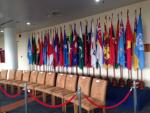
Making Sendai Framework Work for Business: A Roundtable Discussion on Disaster Resilience.
An event organized by the Task Force on Disaster Risk Reduction (DRR) ESCAP Business Advisory Council . Asia Pacific Forum on Sustainable Development. United Nations Conference Centre, Bangkok, 19 May 2015.
“There is a need for the public and private sectors and civil society organizations, as well as academia and scientific and research institutions, to work more closely together and to create opportunities for collaboration, and for businesses to integrate disaster risk into their management practices” (Sendai Framework for DRR 2015-2030)
B A C K G R O U N D The recent 3rd World Conference on Disaster Risk Reduction, held in Sendai – Japan in March 2015, recently concluded with the adoption of “Sendai Framework for Disaster Risk Reduction 2015 – 2030”, a blue-print of the world’s risk reduction for the next 15 years. The Framework recognizes the crucial roles of private sector to make or break the resilience of society at large.
The time is high for business community to discuss the implications of this Framework to businesses in Asia Pacific. A joint publication of ESCAP, ADPC and R3ADY Asia Pacific entitled “Resilient Business for Resilient Nations and Communities”, and the Sendai Framework itself will stimulate the roundtable discussion to generate both policy and actionable recommendations.
In the discussion, the objective is to address Sendai Framework's specific takeaways for business community in Asia Pacific, around the following line of thinking:
a. What are the measures to promote resilience of business, particularly the SMEs?
b. What strategic ways are there for business to contribute to the society's resilience?
c. What can we do to promote a favourable enabling environment for such initiatives?
Key resources are shared for preparation:
1. Sendai Framework for Disaster Risk Reduction 2015 - 2030
2. Resilient Business for Resilient Nations: An Extended Executive Summary (http://www.unescap.org/resources/resilient-business-resilient-nations-and-communities)
During the discussion Business Continuity and Productvity Asia-Pacific Institute (BCPAI) has given an overview inputs to the meeting as follows:
1) In order to promote resilience to the private sector (or business sector), we should not only focus on any individual standalone organization (even they are SMEs), to establish effective strategic approach, we should also consider them as a member of their business supply chain (or cluster). Therefore, interaction between members in the supply chain should be understood. We should know who are their customers (and what are their customer's expectations), what are their underlying resources, what are their dependencies etc., and then these can lead to the appropriate business resilience strategic set up for them.
2) In order to promote a favorable enabling environment for the organization. The customer driven approach is also interesting. According to the recent research by Business Continuity Institute (BCI). Supply chain disruption is considered as the most increasing significant threat to business organizations in the modern trade. Many MNCs have already required their suppliers to implement business continuity plan or even get certified to ISO22301:2012 (business continuity management system). So if we can promote these schemes to MNCs or leading companies, the consequences could be positive impact in term of increasing business resilience to the whole supply chain including SMEs. However, resources including budget should be provided as needed.
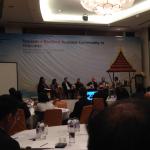
Asian Disaster Preparedness Center (ADPC) in cooperation with the Office of Small and Medium Enterprises Promotion (OSMEP) and the Department of Disaster Prevention and Mitigation of Thailand (DDPM) organizes a high-level policy dialogue titled Towards a Resilient Business Community: Small and Medium Enterprises (SMEs) and Disaster Risk Reduction on 8−9 October 2014 in Bangkok, Thailand.
Participated by more than 120 SMEs, high-level policy makers including a representative from BCPAI and prominent investor countries to Thailand, the forum will highlight the achievements and challenges of Thailand’s private sector disaster resilience and explore recommendations on future engagement. The aim is to create an enabling environment for business continuity planning and risk-informed investments.
Supported by the JTI Foundation, the forum is an opportunity for the business owners in Thailand to learn about the global best practices in business resilience and to discuss ways to maintain Thailand’s reputation as a prosperous and safe country for private investments.
It will also provide a platform for discussion about the private sector’s role in disaster risk reduction ahead of the Third UN World Conference on Disaster Risk Reduction in Sendai, Japan in 2015, which will define the global framework on disaster risk reduction following the 10-year Hyogo Framework for Action.
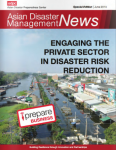
Asian Disaster Preparedness Center - ADPC has published a special edition of Asian Disaster Management News on private sector engagement in disaster risk reduction.
The special edition of ADPC's Asian Disaster Management News captures perspectives of a number of experts on the topical issue of engaging private sector in disaster risk reduction.
The newsletter features articles by The Asia Foundation, Stephan Huppertz from German International Cooperation (GIZ), Vikram Rao from AGT International, Masahiko Haraguchi and Dr. Upmanu Lall from Columbia University, and Rinske Geerlings from Business As Usual, among several other experts from around the world.
BCPAI is also acknowledged as an organization for capacity building of BCM for SMEs in Thailand.
Through the special edition of its newsletter, ADPC aims to facilitate further discussion on the topic of private sector’s role disaster risk management at the 6th Asian Ministerial Conference on Disaster Risk Reduction in Bangkok on 22−26 June 2014.

The Ministers, and Heads of Delegation of the countries of Asia and the Pacific, attended the Sixth Asian Ministerial Conference on Disaster Risk Reduction (AMCDRR) (การประชุมระดับรัฐมนตรีแห่งเอเชียว่าด้วยการลดความเสี่ยงจากภัยพิบัติ ครั้งที่ 6) in Bangkok, hosted by the Royal Thai Government, 22-26 June 2014.
In the Bangkok Declaration, On Private Sector Role – Public & Private Partnership for Disaster Risk Reduction: Encourage a shift from response-oriented actions to risk-informed investments as part of the business process. Increase dialogue among all stakeholders to identify barriers and opportunities to build an enabling environment for public-private and other partnerships. Encourage the development of regulations, incentives and tools to motivate improvement in disaster risk management by the private sector with an emphasis on micro, small and medium enterprises. Strengthen private sector commitments to integrate risk assessment and use of risk information indecision making and practices, contributing to their business sustainability and resilience as well as of the environment in which they operate.
The full Bangkok Declaration can be found here. [http://goo.gl/qYS05h]
Business Continuity and Productivity Asia-Pacific Institute (BCPAI) was invited to attend the Technical Session 3: The Private Sector’s Role: Public and Private Partnership for Disaster Risk Reduction at the 6th Asian Ministerial Conference on Disaster Risk Reduction (การประชุมระดับรัฐมนตรีแห่งเอเชียว่าด้วยการลดความเสี่ยงจากภัยพิบัติ ครั้งที่ 6) on 25 June 2014. The event, led by UNESCAP and Asian Disaster Preparedness Center (ADPC), took place at World Ballroom B from 14:00-16:00 hrs, Centara Grand at Central World.
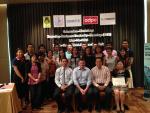
Training "Orientation Work Shop: Business Continuity Planning (BCP)", 29 May 2014, Eastin Grand Hotel Sathorn, Bangkok, Thailand, organized by: Asian Disaster Preparedness Center: ADPC, Department of Prevention and Mitigation, Office of Small and Medium Enterprises Promotion (OSMEP), and JTI foundation. A lecture was given by Komsan Sanongpong, Pol.Maj., Ph.D., Executive Director, BCPAI and ADPC team.
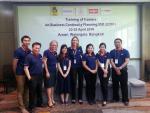
Training of Trainers on Business Continuity Planning (ISO22301) @ Amari Watergate Bangkok, 23-25 April 2014, organized by: Asian Disaster Preparedness Center: ADPC, Department of Prevention and Mitigation, Office of Small and Medium Enterprises Promotion (OSMEP), JTI foundation and APEC SME Crisis Management Center.
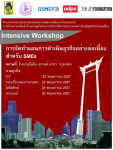
ขอเชิญเข้าร่วมอบรมสัมมนาฟรี "Intensive Work Shop การจัดทำแผนการดำเนินธุรกิจอย่างต่อเนื่องสำหรับ SMEs"
วัน เวลา และสถานที่
วันที่ 22 พฤษภาคม 2557 : ธุรกิจ ICT
วันที่ 23พฤษภาคม 2557: ธุรกิจท่องเที่ยวและการเกษตร
วันที่ 29 พฤษภาคม 2557 : ธุรกิจโลจิสติกส์
วันที่ 30 พฤษภาคม 2557 : ธุรกิจยานยนต์
เวลา 9.00-16.00 น.ณ โรงแรมอีสติน แกรนด์ สาทร
*ไม่มีค่าใช้จ่ายใดๆ และหลักสูตรนี้มีใบประกาศนียบัตร*
รับจำนวนจำกัด ไม่เกิน 30 ท่าน ปิดรับสมัคร 7 พฤษภาคม 2557
สอบถามเพิ่มเติมได้ที่
[email protected] Tel. 02-298-0681 Ext. 315/317
จัดโดยศูนย์เตรียมความพร้อมป้องกันภัยพิบัติแห่งเอเชีย(Asian Disaster Preparedness Center: ADPC) ร่วมกับ กรมป้องกันและบรรเทาสาธารณภัย (ปภ.) และสำนักงานส่งเสริมวิสาหกิจขนาดกลางและขนาดย่อม (สสว.)
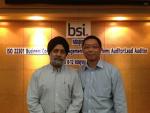
Pol.Maj.Komsan Sanongpong, Ph.D. (right), Executive Director, BCPA Institute, and Mr. Gurpreet Singh (left), Master trainer of First-batch ISO22301:2012 Business Continuity Management (BCM) Auditor/ Lead Auditor course IRCA No. A 17456 in Thailand, organized by BSI during 8-12 July 2013.
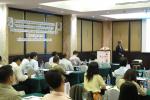
Recent natural disasters, technology misadventure, energy shortage, terrorism, political riots, and other man-made crisis have shown that severe incidents can happen at any time, impacting both the public and private sectors. This challenge goes beyond existing emergency response plan or disaster management guidelines that were previously implemented. The ability to recover from a disaster of an organization is directly concerned to the level of business continuity planning set up prior to the disaster. Studies indicate that two out of five organizations that encounter a disaster will go out of business within five years of the crisis.
In order to help support organizations in Thailand to be ready for this challenge, especially for those who were affected by severe flood in late 2011. Business Continuity and Productivity Asia-Pacific Institute (BCPAI) and University of Interdisciplinary Studies (UIDS), USA , have organized the following training course:
“Implementing Business Continuity Management (BCM) with ISO22301 and Writing Business Continuity Plan (BCP)” (conducted in Thai), on June 4-5, 2013, Amari Donmuang Hotel, Bangkok
There were managements, senior staffs and staffs from various organizations attended this class. These organizations included SCG Paper, PTT PCL, Deposit Protection Agency - Ministry of Finance, Faculty of Engineering - Rmutt, NIDA, Hino Motors Sales (Thailand), Thai Glass Industries PCL., Ito-Thai Metal Work, Ito-Thai Auto Body Work, P&G Intersupply, Prima Network, Emhart Teknologies (Thailand), and Shin-Ei Precision (Thailand).



